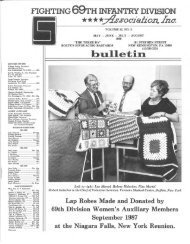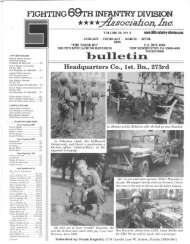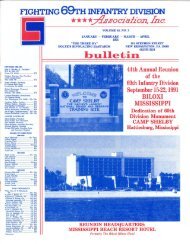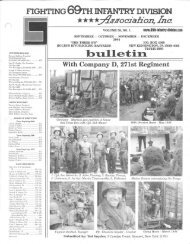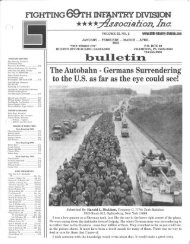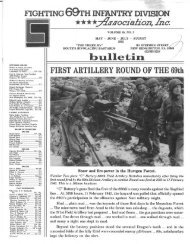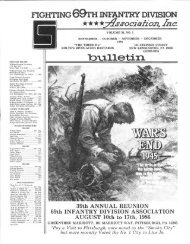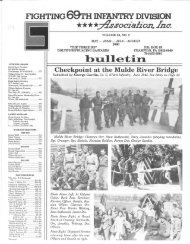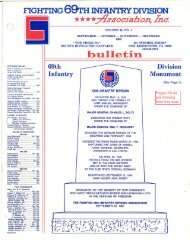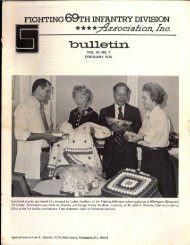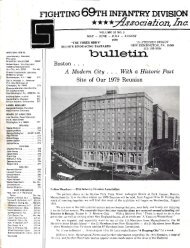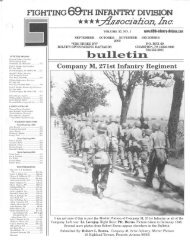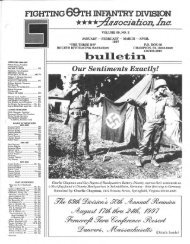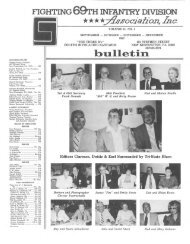The Fighting 69th Infantry Division Association, Inc. Vol. 57 No. 3 ...
The Fighting 69th Infantry Division Association, Inc. Vol. 57 No. 3 ...
The Fighting 69th Infantry Division Association, Inc. Vol. 57 No. 3 ...
Create successful ePaper yourself
Turn your PDF publications into a flip-book with our unique Google optimized e-Paper software.
Trespass Against <strong>The</strong>m<br />
History of the 271st <strong>Infantry</strong><br />
Submitted By: Lawrence Verheye<br />
Company F, 271st <strong>Infantry</strong><br />
1251 Pierce Road<br />
Wakarusa, Indiana 46<strong>57</strong>3-9616<br />
Written By: Lt. John F. Higgins, 2nd Battalion<br />
Entering Germany<br />
<strong>The</strong> 10th of February was the day we entered<br />
Germany. That morning, we moved out, combatloaded,<br />
and took up the positions occupied by the<br />
395th <strong>Infantry</strong> of the 99th <strong>Division</strong> in the vicinity of<br />
Hollerath, just inside the first belt of pillboxes of the<br />
infamous Siegfried Line. By 1630, all positions had<br />
been taken over, and the battle-green <strong>69th</strong> was ready<br />
to apply the principles learned in all the months of<br />
training.<br />
<strong>The</strong> men were far from comfortable that first night.<br />
With only one blanket and a sleeping bag in the belowfreezing<br />
weather, not to mention the fact that we were<br />
subjected to harassing artillery fire, supplemented by<br />
"screaming meemies" and considerable use of the<br />
flares. Extensive patrol activity, aimed at feeling out<br />
the strength and disposition of the enemy, was carried<br />
out for the following two weeks, and it was not long<br />
before most men had become quite used to life at the<br />
front. As someone put it: ''You don't have to worry<br />
about the ones you can hear!" Mter a time, you can<br />
fairly accurately tell where they will land. Morale of<br />
the command was excellent, especially when the<br />
kitchens arrived in the area, and it was possible to<br />
send up hot food to the men in the line.<br />
During this period, all duffle bags were turned in,<br />
so that the units could travel fast and light. Condition<br />
of roads in the area was wretched, which seriously<br />
accentuated the supply problem. In the 17 days before<br />
our first attack, 30 prisoners were taken, of whom 10<br />
were captured by our patrols. In this area too, great<br />
emphasis was put on maintaining weapons and equipment<br />
as well as much attention to proper sanitation.<br />
First Attack<br />
Mter being postponed several times, our first attack<br />
was launched at 0600, 27 February. We arose at 0300,<br />
had breakfast and spent the remainder of the time in<br />
final preparations. <strong>The</strong> night was very still, and a<br />
slight mist hung in the air, an ideal morning for our<br />
purpose. It is not boasting to say here that anyone who<br />
had come into our area that morning could have accurately<br />
predicted that we would measure up to any<br />
combat assignment given us. <strong>The</strong>re was no vis able<br />
nervousness, no confusion, no slackening of morale.<br />
Everyone stood ready to perform his assigned tasks as<br />
though it were maneuvers at Shelby, secure in the<br />
knowledge that whatever exigencies arose, we were<br />
ready. To borrow the much-used expression: "This was<br />
it!", and every man in the 271st knew it.<br />
-11-<br />
<strong>The</strong> plan of attack was as follows: <strong>The</strong> <strong>69th</strong><br />
<strong>Division</strong>, two regiments abreast, with the 661st Tank<br />
Destroyer Battalion, were to seize and hold the high<br />
ground between Honningen and Giescheld inclusive,<br />
in order to clear the Hellenthal-Hollerath road for use<br />
as a supply route.<br />
<strong>The</strong> 271st <strong>Infantry</strong>, with 879th Field Artillery, 880th<br />
Field Artillery and Company A of the 2<strong>69th</strong> Engineers<br />
in support, would seize and hold its portion of the<br />
<strong>Division</strong> objective, after which it would be prepared to<br />
assist by fire the 273rd in the capture of Giescheid.<br />
<strong>The</strong> Second Battalion, with the 879th Field Artillery,<br />
a platoon of Engineers, a platoon of Company C, 661st<br />
Tank Destroyer in support, was on the left; the First<br />
Battalion on the right, and the Third Battalion in<br />
reserve. <strong>The</strong> Third was to stand ready to furnish carrying<br />
parties to the attacking battalions during the<br />
hours of darkness, and also to occupy Dickerscheid<br />
with one company, upon call from Second Battalion,<br />
when the town was captured.<br />
Cannon Company supported the attack of the regiment,<br />
with priority of fire to the Second Battalion.<br />
Anti-Tank Company was to provide litter squads, and<br />
also have its mine platoon sweep the roads to<br />
Dickerscheid and Buschem, after clearing mines in the<br />
vicinity of the bridge site. Company A of the 2<strong>69th</strong><br />
Engineers was to construct a bridge in Second<br />
Battalion sector, and also clear mines and abatis in the<br />
First Battalion area. <strong>The</strong>se were the plans, and with<br />
them well in mind, the 271st <strong>Infantry</strong> Regiment went<br />
into action the morning of 27 February 1945.<br />
<strong>The</strong> First and Second Battalions crossed the line of<br />
departure on time and advanced towards their objectives.<br />
With a few unavoidable exceptions, the regiment<br />
reached and held its objective according to plan.<br />
<strong>The</strong> First Battalion, in the face of stiff resistance,<br />
achieved its objective by 1030, with all companies committed.<br />
<strong>The</strong> remainder ofthe day they spent digging in<br />
and consolidating their positions.<br />
Company G of the Second Battalion attacked<br />
Dickerscheid and by noon had taken four houses; by<br />
1700 had nearly completed mopping up the town.<br />
Company F, attacking Buschem and Honningen, was<br />
able to take half of Buschem before being pinned down<br />
by fire from nearby Honningen, and was ordered to<br />
hold its present position for the night. One platoon of<br />
Company E assisted G in mopping up Dickerscheid<br />
and clearing the woods east of the town. Company K<br />
was then ordered to occupy Dickerscheid, which was<br />
accomplished, releasing G Company to close the gap<br />
between themselves and F Company.<br />
<strong>The</strong> Third Battalion was alerted that night, but not<br />
committed until the next day. <strong>The</strong> next morning, E<br />
Company was committed to assist F Company, and the<br />
two companies cleared Buschem and went on to take<br />
Honningen. Two counterattacks were repulsed in the<br />
area.<br />
(Continued on Page 12)



